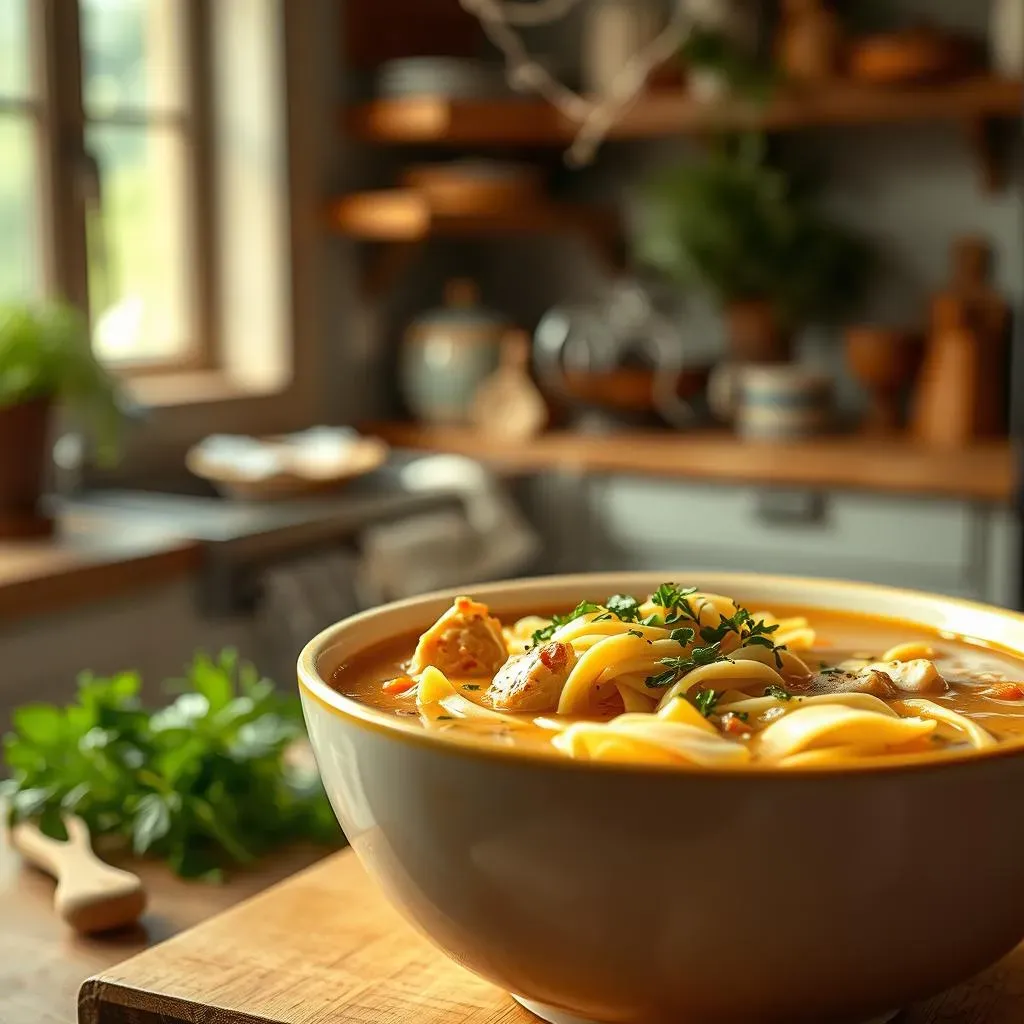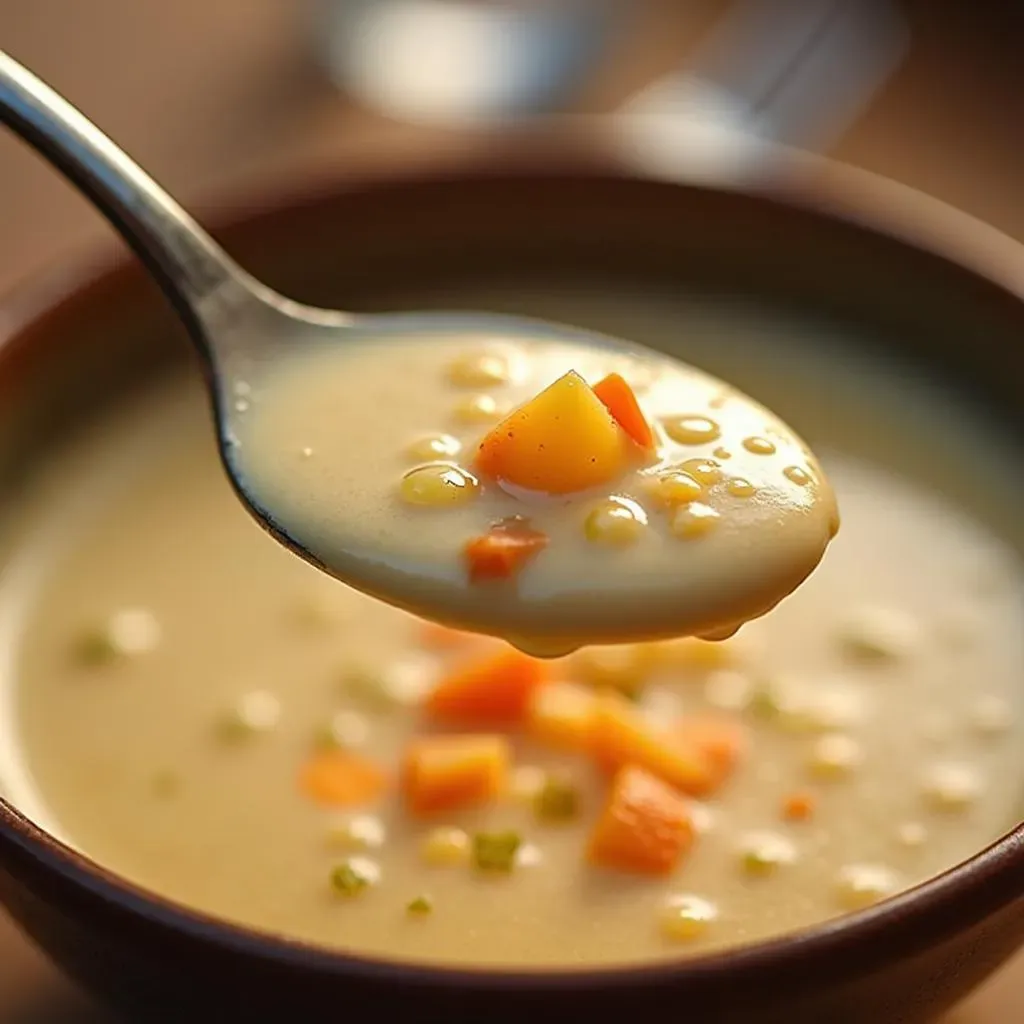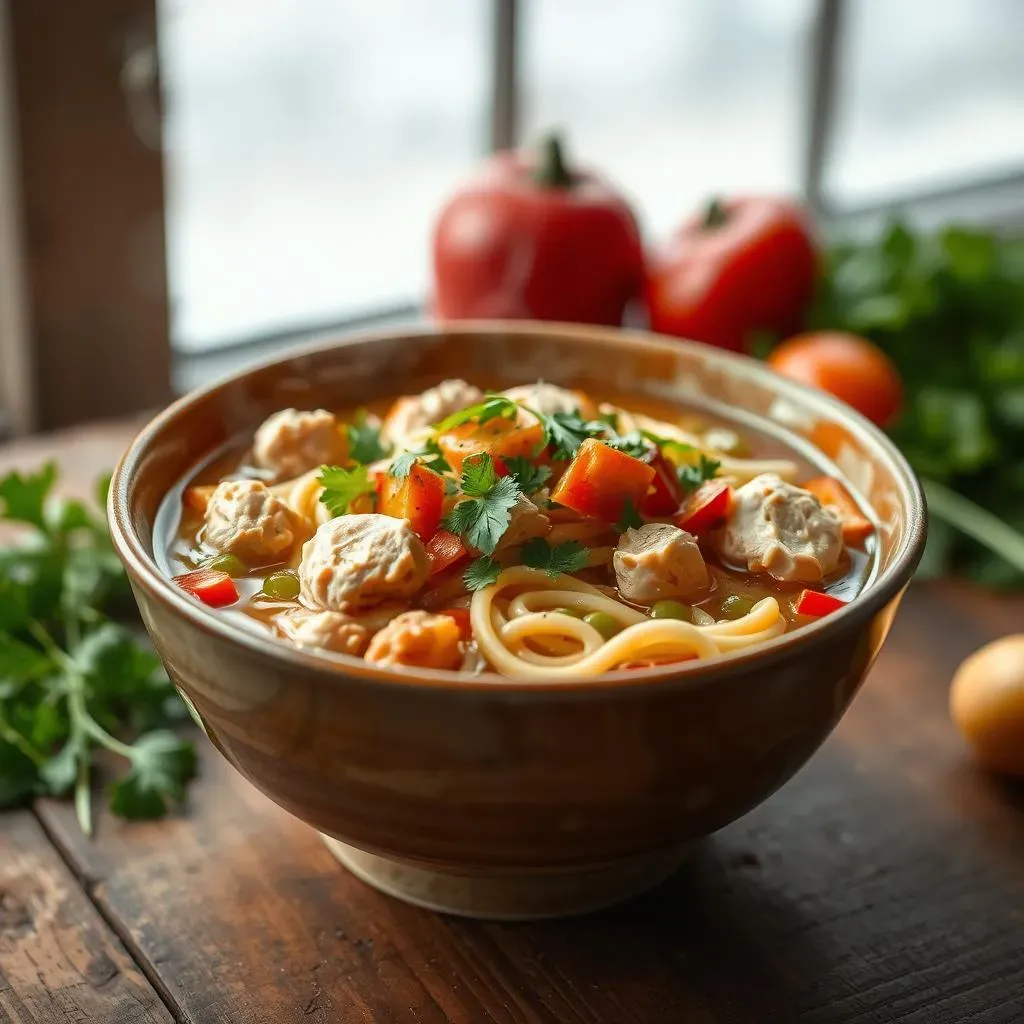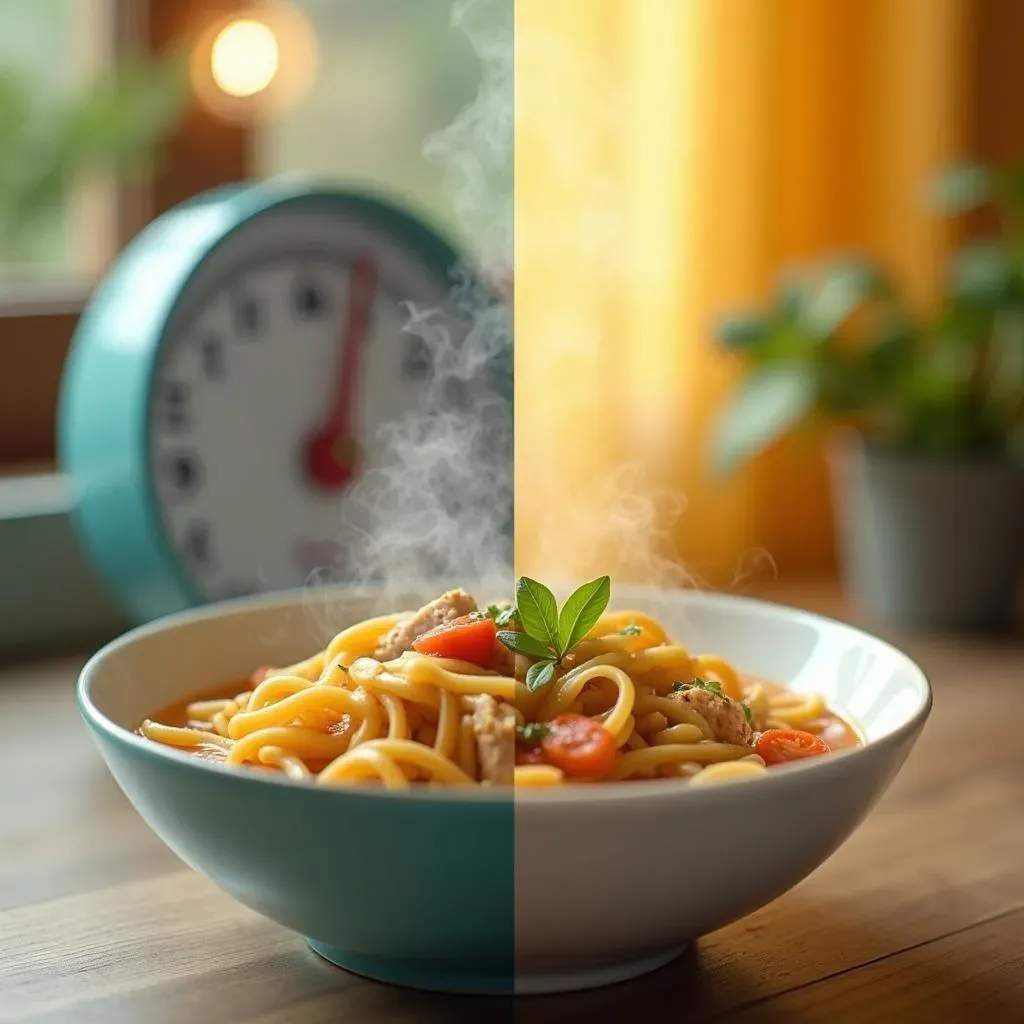Table of Contents
Chicken noodle soup, a classic comfort food, often evokes images of warmth and healing. But, if you're like me, you’ve probably wondered: "Will chicken noodle soup make you fat?" It's a fair question, especially when we're bombarded with diet advice and calorie counts. We've all seen those "healthy" soups that are secretly loaded with hidden fats and carbs, right? This article isn't about demonizing your favorite bowl, but rather, it's about understanding what's really in it. We'll explore the calorie content, pinpoint the sneaky ingredients that can lead to weight gain, and, most importantly, show you how to make chicken noodle soup a healthy and satisfying meal. So, let's ladle into the facts and figure out how to enjoy this classic without the guilt. Think of it as a soup-er deep dive into what makes a bowl of soup a friend, not a foe, to your waistline.
Chicken Noodle Soup: A Comfort Food Under Scrutiny

Chicken Noodle Soup: A Comfort Food Under Scrutiny
The Nostalgia Factor
Let's be real, chicken noodle soup isn't just food; it's a hug in a bowl. Most of us grew up with it, right? Maybe your grandma made it when you were sick, or it was your go-to meal on a cold day. This emotional connection makes it hard to view it objectively. It's like that comfy old sweater you love, even if it's a bit worn. But, just like that sweater, we have to examine if it's still serving us well. So, we're not here to ruin the nostalgia, but to see if our beloved soup is also secretly a wolf in sheep's clothing.
Beyond the Warm Fuzzies
The problem is, while the memories are warm and fuzzy, the actual nutritional value can vary wildly. I mean, think about it: some versions are loaded with noodles, others with veggies, and some with a questionable amount of fat. It's not a one-size-fits-all situation, and that's where we need to pay attention. The simple fact that it's "chicken noodle soup" doesn't automatically make it healthy, despite what our childhood memories might tell us. It's like believing every superhero movie is good – we know that's just not true.
Soup Type | Potential Benefits | Potential Drawbacks |
|---|---|---|
Homemade, veggie-heavy | High in vitamins, fiber, hydration | Can be time-consuming to prepare |
Restaurant version | Quick and convenient | Often high in sodium, fat, and processed ingredients |
Canned soup | Long shelf life, affordable | May contain preservatives, higher sodium levels |
The "Healthy" Halo
There's this idea that soup, in general, is automatically healthy. It's like, if it's not fried, it must be good for you, right? But that's not always the case, especially with chicken noodle soup. We've got to look beyond the "soup" label and break down the ingredients. Because a lot of the time, it’s the sneaky stuff that gets you. It’s like thinking you're getting a great deal, but then you find out about all the hidden fees. We're digging past the surface to see what's really going on in that bowl.
The Calorie Count: What's Really in Your Bowl?

The Calorie Count: What's Really in Your Bowl?
The Calorie Mystery
so let's get real about calories. It's not about demonizing them, but understanding them. When we talk about chicken noodle soup, the calorie count can be all over the place. It's like trying to guess how many jelly beans are in a jar – it depends on the jar! A small, homemade bowl might be surprisingly low, while a large restaurant serving could be a calorie bomb. The key is to look beyond the simple label of "soup" and consider the ingredients. Are we talking about a light broth or a creamy, heavy concoction? This makes a big difference in the calorie count and how it impacts your waistline.
Think about it this way: a spoonful of sugar has calories, right? Now imagine a bowl of noodles, a generous amount of chicken, and maybe some added oil. Suddenly, the calories add up quickly, even if it's "just soup." We're not saying all calories are bad, but being aware of the numbers is crucial. It's like knowing the speed limit on the highway – it helps you stay on track and avoid unwanted surprises. So, let's not be naive about the calorie count; let’s break it down to get a clearer picture.
Ingredient Breakdown
Here's where things get interesting. The calories in your soup aren't just one big lump of "soup calories." They come from the individual ingredients. Noodles, for example, can be a major source of carbs and therefore calories. The type of chicken (skin on or off, dark or light meat) also impacts the fat and calorie content. And don't even get me started on added oils or cream – those can quickly turn a light soup into a calorie-heavy meal. It's like building a house; each brick (or ingredient) adds to the overall structure (or calorie count). So, let's examine the "bricks" in our soup to understand the overall calorie picture.
And hey, it's not just about the big stuff. Even those innocent-looking veggies can contribute to the calorie count, though they’re generally a healthier source of calories. It's all about balance, right? A cup of broccoli isn't the same as a cup of noodles. We're talking about understanding the nutritional density of the ingredients, not just the calorie numbers. It's like knowing the difference between a regular gas and premium gas for your car; both are fuel, but one is better in the long run.
Ingredient | Approximate Calories (per serving) | Notes |
|---|---|---|
Noodles (1 cup cooked) | 150-200 | Varies by type (egg, wheat, etc.) |
Chicken (3 oz, cooked) | 120-180 | Varies by cut (breast, thigh) and skin |
Broth (1 cup) | 10-50 | Varies by type (chicken, vegetable) and sodium |
Vegetables (1 cup mixed) | 25-75 | Varies by type and preparation |
Added Oil (1 tbsp) | 120 | Adds significantly to calorie count |
Hidden Culprits: How Ingredients Affect Weight Gain

Hidden Culprits: How Ingredients Affect Weight Gain
The Sneaky Sodium Trap
so we've talked calories, but let's zoom in on sodium, the silent saboteur. I mean, who really thinks about salt in soup? But, it's a big deal! Especially in canned soups or restaurant versions, the sodium levels can be off the charts. This isn't just about bloating; high sodium can actually make you retain water, which can show up as extra pounds on the scale. It's like your body is holding on to water like a sponge! And that’s not the good kind of weight gain we are looking for, right? So, when we look at how ingredients affect weight gain, sodium is a sneaky one we have to consider.
Think of it like this: you’re filling a glass with water, and you keep adding salt. Eventually, the water level rises, right? That’s what happens in your body with too much sodium. It’s not actual fat, but it still impacts your weight and can be a real downer. Now, I'm not saying salt is the devil, but moderation is key. We need to be aware of how much is sneaking into our soup. It’s like knowing your limit at a buffet – you want to enjoy it, but not go overboard.
Fatty Additions: The Creamy Deception
Now, let's talk about the creamy stuff. I know, it sounds so comforting, right? But, those creamy soups often come with a hefty dose of added fats. Whether it's heavy cream, butter, or even oil, these additions can quickly turn a light soup into a calorie-dense meal. It's like adding a turbocharger to a bicycle – it goes faster but not necessarily in a good way. This is where ingredients can really affect weight gain. These fats, while delicious, contribute to the calorie count and can pack on the pounds if you're not careful. So, while that creamy texture might feel good, it's worth considering the impact on your waistline. It's like choosing between a regular soda and a diet one; both are sweet, but one has a lot more hidden baggage.
Ingredient | Impact on Weight Gain | Why? |
|---|---|---|
High Sodium | Water retention, increased weight | Causes the body to hold onto water |
Added Fats (Cream, Butter, Oil) | Increased calories, potential weight gain | High calorie density, contributes to fat storage |
Refined Carbs (White Noodles) | Spikes blood sugar, potential weight gain | Quickly digested, can lead to overeating |
The Refined Carb Culprit
Finally, let's chat about those noodles. While they might seem innocent, the type of noodles in your soup can make a difference. Refined carbs, like those found in white pasta, are quickly digested and can cause spikes in your blood sugar. This can lead to energy crashes and, yes, even weight gain. It’s like putting the wrong kind of fuel in your car; it might run for a bit, but it won’t run well and might cause issues down the road. Choosing whole grain options or even swapping noodles for more veggies can help keep you on track. It’s about making smart swaps to keep the soup healthy. It's like upgrading your phone; it's still a phone, but it works better and more efficiently.
Making Chicken Noodle Soup a Healthy Choice

Making Chicken Noodle Soup a Healthy Choice
Lightening Up Your Broth
Alright, so we've talked about the potential pitfalls, but let's get to the good stuff: how to make chicken noodle soup a healthy superstar! It all starts with the broth. Instead of going for creamy, heavy options, try using a light, homemade chicken broth. It's super easy to make, and you can control the sodium levels. Or, if you're short on time, go for a low-sodium store-bought option. This small change can make a big difference in the overall calorie count. Think of it like choosing a lighter base for a painting – it sets the stage for a healthier masterpiece. It's all about making smart swaps to keep your soup light and nutritious.
And hey, don't be afraid to experiment with different broths. Vegetable broth can be a great option, too, especially if you're looking to cut down on fat. The key is to avoid those overly processed, high-sodium broths that can derail your healthy eating goals. It’s like choosing the right kind of wood for building furniture – it’s the foundation that determines the outcome. So, let’s start with a solid, healthy base for our soup.
Packing in the Good Stuff
Now, let's talk about loading up on the good stuff – veggies! Don't skimp on the vegetables; they're your best friend in the soup game. Carrots, celery, onions, spinach, zucchini – the more, the merrier! Not only do they add tons of vitamins and nutrients, but they also add bulk and fiber, which can help you feel fuller for longer. It's like adding color to a black and white photo – it makes it more vibrant and interesting. And don't worry, no one is going to stop you if you want to add more veggies to your soup.
And what about the noodles? Instead of using refined white pasta, try whole grain options or even swapping them out for spiralized veggies, like zucchini noodles. It's a simple change that can make a big difference in the nutritional value of your soup. Think of it like upgrading to a better engine in your car – it still does the job, but more efficiently and with less impact. So, let's pack our soup with as many veggies and healthy alternatives as possible. It's all about making smart choices to maximize the nutritional benefits of our beloved soup.
Healthy Swap | Why It's Better |
|---|---|
Low Sodium Broth | Reduced sodium intake, better for hydration |
Whole Grain Noodles | Higher in fiber, better blood sugar control |
Spiralized Veggies | Lower in carbs, adds extra nutrients |
Lean Chicken (Breast, Skinless) | Lower in fat, still high in protein |
Lots of Veggies | Adds fiber, vitamins, and minerals |
The Bottom Line: Soup Smart, Eat Well
So, will chicken noodle soup make you fat? The answer, like most things in nutrition, isn't a simple yes or no. It really depends on what's in your bowl. If you're mindfully choosing your ingredients, focusing on lean protein, lots of veggies, and whole grains, you can absolutely enjoy chicken noodle soup as a healthy, weight-conscious meal. The key takeaway here is that awareness is power. Don't let pre-packaged soups or recipes with hidden fats sneak past you. By being a bit savvy and making smart choices, you can keep chicken noodle soup on the menu and your weight goals on track. Now, go forth and enjoy your soup, knowing you're making a choice that's both comforting and good for you.
